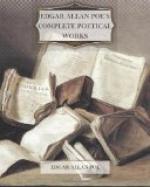“I dare say Milton preferred ‘Comus’ to either—if so—justly.
“As I am speaking of poetry, it will not be amiss to touch slightly upon the most singular heresy in its modern history—the heresy of what is called, very foolishly, the Lake School. Some years ago I might have been induced, by an occasion like the present, to attempt a formal refutation of their doctrine; at present it would be a work of supererogation. The wise must bow to the wisdom of such men as Coleridge and Southey, but being wise, have laughed at poetical theories so prosaically exemplified.
“Aristotle, with singular assurance, has declared poetry the most philosophical of all writings—but it required a Wordsworth to pronounce it the most metaphysical. He seems to think that the end of poetry is, or should be, instruction; yet it is a truism that the end of our existence is happiness; if so, the end of every separate part of our existence, everything connected with our existence, should be still happiness. Therefore the end of instruction should be happiness; and happiness is another name for pleasure;—therefore the end of instruction should be pleasure: yet we see the above-mentioned opinion implies precisely the reverse.
“To proceed: ceteris paribus, he who pleases is of more importance to his fellow-men than he who instructs, since utility is happiness, and pleasure is the end already obtained which instruction is merely the means of obtaining.
“I see no reason, then, why our metaphysical poets should plume themselves so much on the utility of their works, unless indeed they refer to instruction with eternity in view; in which case, sincere respect for their piety would not allow me to express my contempt for their judgment; contempt which it would be difficult to conceal, since their writings are professedly to be understood by the few, and it is the many who stand in need of salvation. In such case I should no doubt be tempted to think of the devil in ‘Melmoth,’ who labors indefatigably, through three octavo volumes, to accomplish the destruction of one or two souls, while any common devil would have demolished one or two thousand.
“Against the subtleties which would make poetry a study—not a passion—it becomes the metaphysician to reason—but the poet to protest. Yet Wordsworth and Coleridge are men in years; the one imbued in contemplation from his childhood; the other a giant in intellect and learning. The diffidence, then, with which I venture to dispute their authority would be overwhelming did I not feel, from the bottom of my heart, that learning has little to do with the imagination—intellect with the passions—or age with poetry.
“’Trifles, like straws, upon
the surface flow;
He who would search for pearls must dive
below,’
“are lines which have done much mischief. As regards the greater truths, men oftener err by seeking them at the bottom than at the top; Truth lies in the huge abysses where wisdom is sought—not in the palpable palaces where she is found. The ancients were not always right in hiding the goddess in a well; witness the light which Bacon has thrown upon philosophy; witness the principles of our divine faith—that moral mechanism by which the simplicity of a child may overbalance the wisdom of a man.




